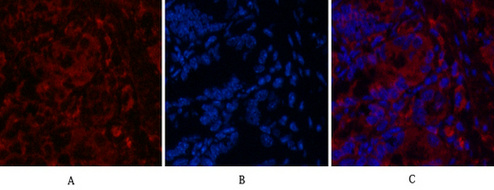
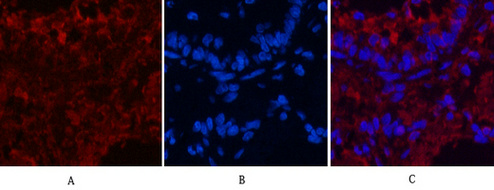
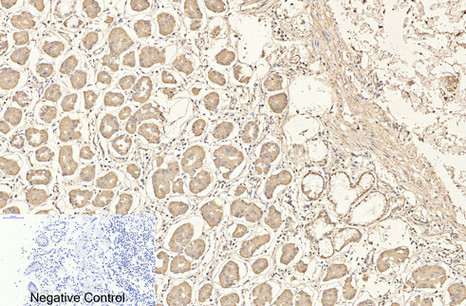
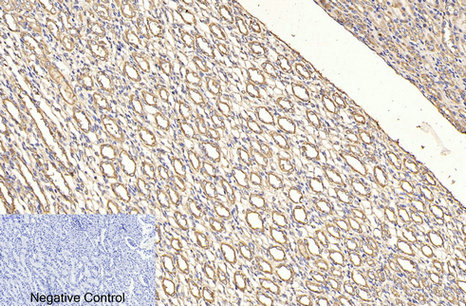
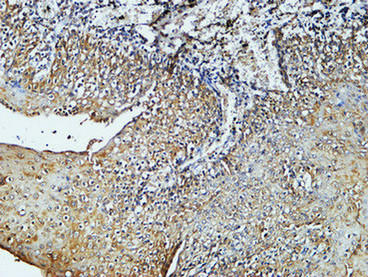
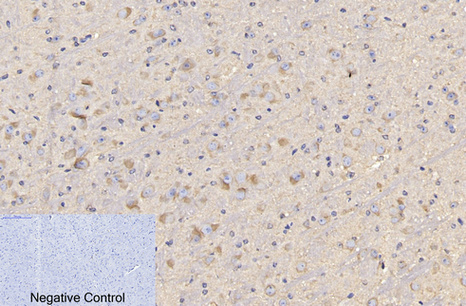
| WB | 咨询技术 | Human,Mouse,Rat |
| IF | 咨询技术 | Human,Mouse,Rat |
| IHC | 1/50-1/100 | Human,Mouse,Rat |
| ICC | 技术咨询 | Human,Mouse,Rat |
| FCM | 咨询技术 | Human,Mouse,Rat |
| Elisa | 咨询技术 | Human,Mouse,Rat |
| Aliases | CD4; T-cell surface glycoprotein CD4; T-cell surface antigen T4/Leu-3; CD antigen CD4 |
| Entrez GeneID | 920 |
| clone | 6B10 |
| Host/Isotype | Mouse IgG1 |
| Antibody Type | Primary antibody |
| Storage | Store at 4°C short term. Aliquot and store at -20°C long term. Avoid freeze/thaw cycles. |
| Species Reactivity | Human,Mouse,Rat |
| Immunogen | Synthetic peptide conjugated to KLH. |
| Formulation | Purified antibody in PBS with 0.05% sodium azide,0.5%BSA and 50% glycerol. |
+ +
以下是关于CD4抗体的3篇模拟参考文献示例(非真实文献,仅供格式参考):
---
1. **文献名称**: "Structural insights into CD4 recognition by HIV-1 envelope glycoprotein"
**作者**: Smith A, et al.
**摘要**: 本研究通过X射线晶体学解析了CD4抗体与HIV-1包膜蛋白gp120结合的分子机制,揭示了抗体通过阻断CD4与gp120相互作用抑制病毒入侵的关键结构域。
---
2. **文献名称**: "Therapeutic targeting of CD4+ T cells using monoclonal antibodies in autoimmune diseases"
**作者**: Brown C, et al.
**摘要**: 文章评估了抗CD4单克隆抗体在类风湿性关节炎和红斑狼疮中的治疗效果,证明其可通过选择性耗竭或抑制过度活化的CD4+ T细胞减轻自身免疫反应。
---
3. **文献名称**: "CD4 antibody-drug conjugates for targeted immunotherapy of HIV latency"
**作者**: Lee D, et al.
**摘要**: 研究开发了一种新型CD4抗体-药物偶联物(ADC),能够特异性地靶向潜伏感染HIV的CD4+ T细胞,并通过释放毒素清除病毒储存库,为HIV治愈提供新策略。
---
**注**:以上文献为模拟内容,实际引用时需检索真实数据库(如PubMed)并核实信息。
CD4 antibodies target the CD4 glycoprotein, a key surface receptor predominantly expressed on helper T cells, regulatory T cells, monocytes, macrophages, and dendritic cells. CD4 plays a critical role in adaptive immunity by stabilizing interactions between the T-cell receptor (TCR) and major histocompatibility complex class II (MHC II) molecules on antigen-presenting cells. Structurally, CD4 consists of four immunoglobulin-like domains (D1-D4), with D1 and D2 directly engaging MHC II. Additionally, CD4 acts as a co-receptor by binding to the tyrosine kinase Lck, facilitating TCR-mediated signaling and T-cell activation.
CD4 antibodies are widely utilized in research and diagnostics. In flow cytometry, they enable identification and isolation of CD4+ T-cell subsets, crucial for studying immune responses in infections, autoimmune diseases, and cancer. Therapeutically, anti-CD4 monoclonal antibodies (e.g., ibalizumab) have been developed to block HIV entry, as CD4 serves as the primary receptor for HIV-1. Some antibodies deplete CD4+ cells or modulate immune activity, offering potential in treating autoimmune disorders like rheumatoid arthritis. However, therapeutic use requires caution due to risks of immunosuppression. Beyond HIV, CD4 antibodies are tools for investigating T-cell development, immune regulation, and pathogen interactions. Their dual role as research reagents and therapeutic agents underscores their significance in immunology and translational medicine.
×